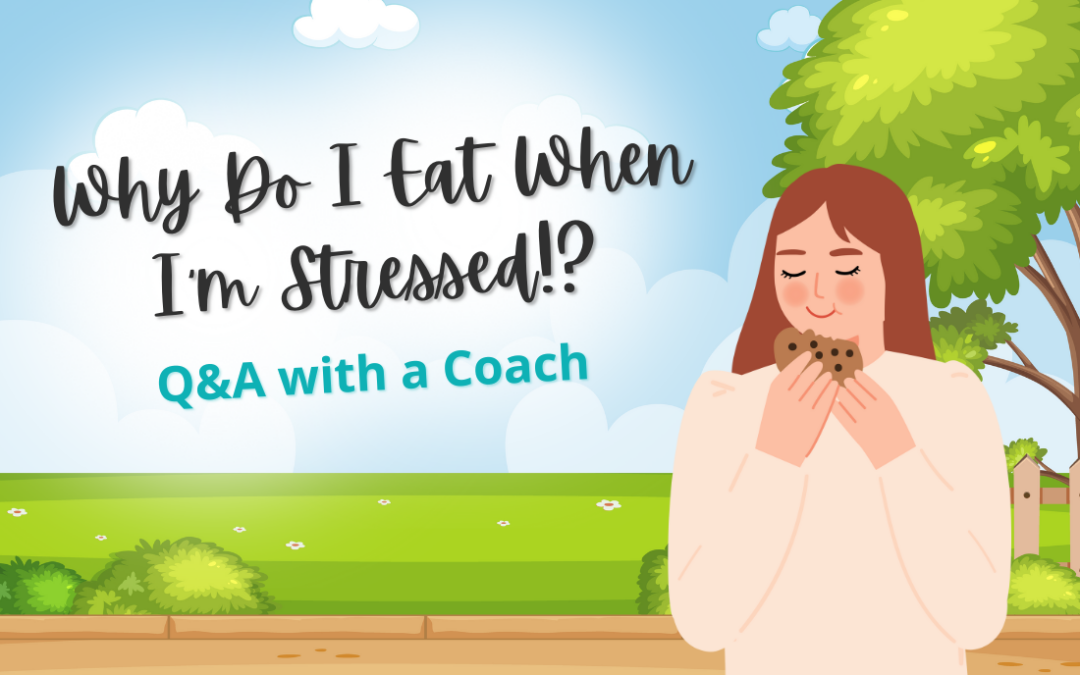“Why do I eat when I’m stressed?”
Stress eating (or emotional eating) is something many of us turn to when life feels overwhelming, and it’s often tied to both emotional and biological triggers. Whether you’re trying to understand why stress makes you reach for snacks or you’re looking for ways to break the habit, you’re in the right place.
In this blog, we’ll explore what’s really going on behind stress eating and I’ll give you practical tips to regain control and feel good about your choices again.
Written by Jenn Hand, Holistic Nutritionist, Board Certified Health Coach, NBC-HWC
Why Do People Stress Eat?
Stress triggers the release of cortisol, a hormone that increases appetite and cravings for high-fat, high-sugar foods.
This response is part of the body’s “fight or flight” mechanism, which prepares it for perceived threats by encouraging energy storage.
Not only that, eating can activate the brain’s reward system, releasing dopamine, which temporarily reduces stress and provides comfort. So it’s entirely normal that you might eat when you’re stressed. (+)
Table of Contents
- My Stress-Eating Story
- Does Stress Affect Appetite?
- What Is the Mood-Food Cycle?
- How to Differentiate Between Real Hunger and Emotional Cravings
- How to Avoid Mindless Eating
- Common Triggers for Stress Eating
- How to Deal with Common Triggers for Stress Eating
- How You Can Relieve Stress Without Using Food to Cope
- How to Get Back on Track After Stress Eating
- Why Sleep Is Critical If You Find Yourself Stress Eating
- When to Seek Coaching or Therapy for Emotional Eating
- Common Questions
My Stress-Eating Story
One of the periods of my life when I stress ate the most was after a hard breakup.
I was in a transitionary period of my life–I was planning to quit my job, move to Ecuador for a year and leave my hometown behind. I was juggling self-doubt, deep sadness and heartbreak, and the endless pressure to “figure out my next life steps.”
Every night when everyone went to bed, I’d find myself in the kitchen, mindlessly snacking on anything I could find—chips, cookies, whatever was there. It wasn’t about the food; it was about numbing the overwhelm I didn’t know how to handle.
What finally helped me break the cycle was learning to pause and get curious about my stress.
I started asking myself, “What am I actually feeling right now?” Sometimes it was anxiety about work or loneliness because I missed my partner. Other times it was doubt and uncertainty. As I practiced sitting with those feelings instead of eating through them, the cravings lost their power. I didn’t need more self-control—I needed to learn how to respond to stress in a different way.
This is the same approach I use with my clients today.
Stress eating isn’t a willpower problem; it’s a sign your body and mind are craving relief.
The good news?
You can find that relief without turning to food. And that’s exactly what we’ll explore in this blog.
Does Stress Affect Appetite?
Stress can impact appetite, though it affects people differently.
For some, stress triggers a loss of appetite as the body prioritizes survival over digestion. For others, stress ramps up cravings for high-sugar, high-fat foods due to increased cortisol levels. These comfort foods provide temporary relief, but the underlying stress remains.
Learning to manage stress through non-food coping strategies can help break the cycle.
I know for me, I always secretly got jealous of people who “didn’t eat when stressed.” I was not one of those people. While eating due to stress was a challenging habit to overcome, my pattern forced me to look at how to deal with stress and manage emotions.
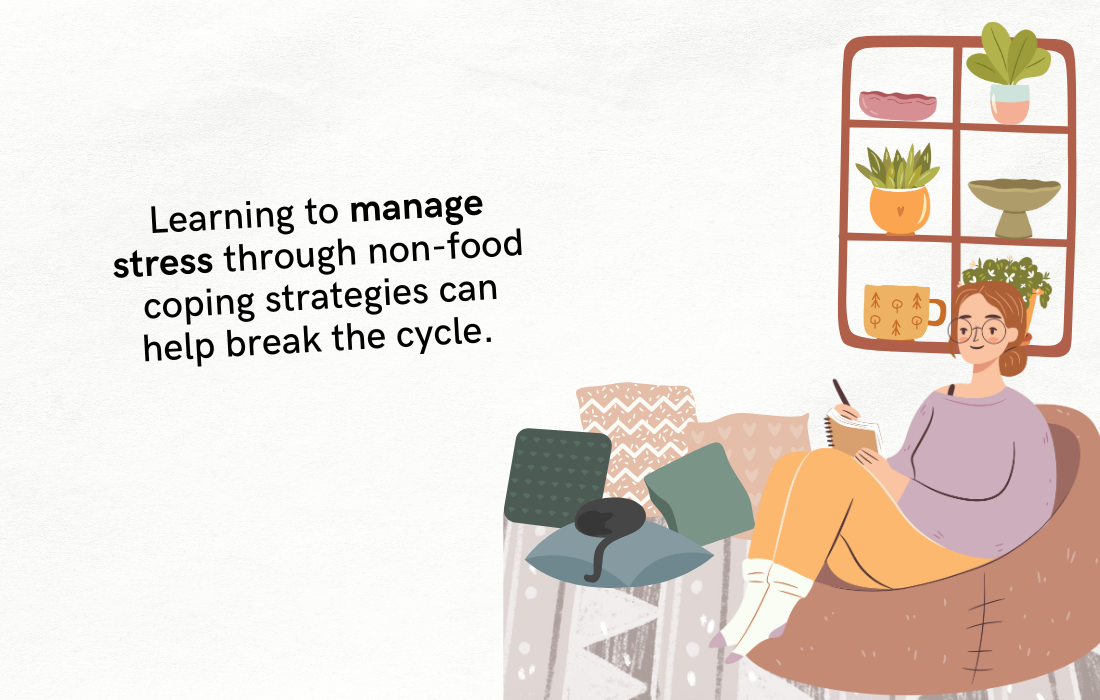
What Is the Mood-Food Cycle?
The mood-food cycle refers to how emotions influence eating habits—and how those eating habits, in turn, affect emotions.
For example, feeling stressed might lead you to reach for sweets for comfort. While you may feel better momentarily, guilt or discomfort can follow, creating more emotional distress. This cycle often becomes automatic, but by pausing and recognizing the pattern, you can interrupt it and respond differently.
My mood-food cycle was usually as follows: feel a strong emotion–>rummage around for food/stop to buy food at the store –>try NOT to eat and battle with myself –>end up giving in and spiraling into “I’m such a failure” –> feeling guilt and despair with a promise of “tomorrow, I’ll start over for good” –>cycle repeats
How to Differentiate Between Real Hunger and Emotional Cravings
Real hunger tends to come on gradually and is often paired with physical cues like a growling stomach or low energy.
Emotional cravings, on the other hand, hit suddenly and are usually for specific, comforting foods. If you’re unsure, pause and ask yourself: “Would I eat a balanced meal right now?” If the answer is no, it’s likely emotional hunger.
How to Avoid Mindless Eating
Mindless eating often happens when we’re distracted or using food to cope with stress.
To avoid it, try to eat without distractions—no phone, TV, or multitasking. Slow down, savor each bite, and check in with your hunger level halfway through. Practicing mindfulness during meals helps you stay connected to your body’s signals and prevents overeating. In an ideal world, we practice slowing down often.
In the realistic day to day hurried lifestyles that we live, it’s more challenging. Do your best to slow down when you can!
Common Triggers for Stress Eating
Take a look at this list.
Can you identify any that might apply to your situation?
- Work Pressure – Deadlines, long hours, or conflicts with colleagues can lead to stress-induced snacking.
- Relationship Issues – Arguments or tension with partners, friends, or family often trigger emotional eating.
- Financial Worries – Concerns about money, debt, or unexpected expenses can increase cravings for comfort foods.
- Boredom – Lack of stimulation or routine can cause mindless eating as a way to pass time.
- Fatigue – Physical or mental exhaustion lowers self-control, making it easier to turn to food for quick energy.
- Negative Self-Talk – Feelings of inadequacy, guilt, or low self-esteem often lead to using food for comfort.
- Major Life Changes – Events like moving, changing jobs, or going through a breakup can create emotional upheaval that drives stress eating.
- Social Pressure – Situations where others are eating, or feeling judged about eating habits, can lead to overeating.
- Health Concerns – Worrying about illness or managing chronic health conditions may trigger emotional eating for relief.
- Lack of Sleep – Sleep deprivation increases cortisol levels and hunger hormones, making stress eating more likely.
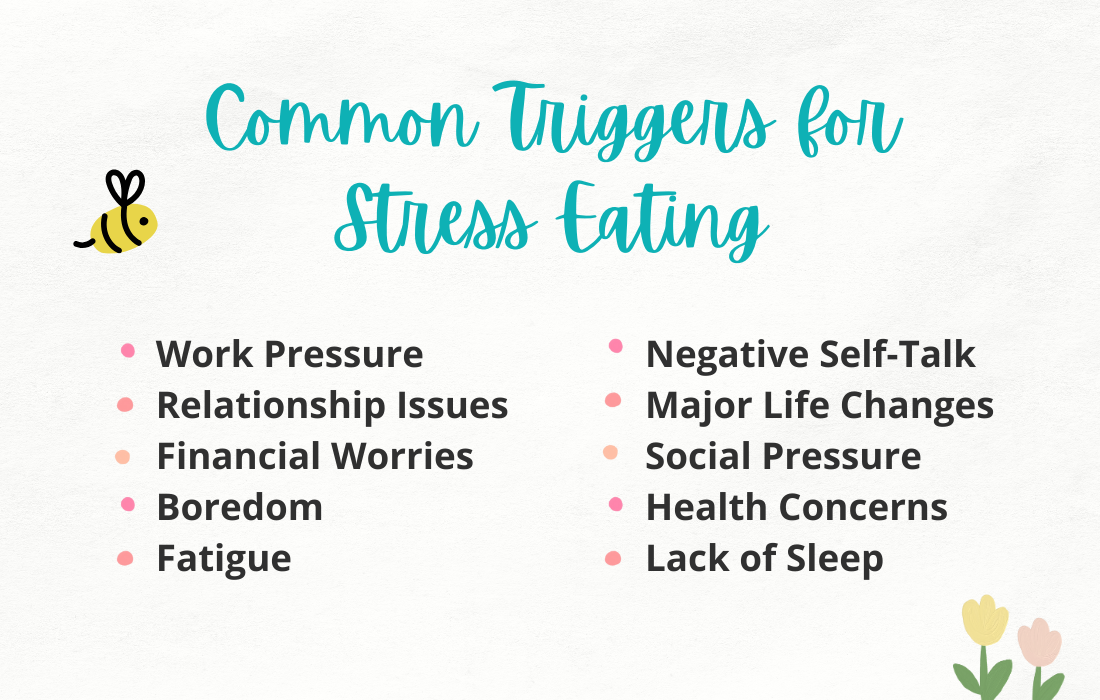
How to Deal with Common Triggers for Stress Eating
These are my top 3 tips to manage stress without using food to cope. I personally use these tactics if I’m feeling stressed. And I’ve recommended these techniques to my clients as well.
1 – Stop, drop and breathe!
When you feel the urge to stress eat, pause and take five deep breaths.
This simple act calms your nervous system and creates space to respond rather than react to the craving.
2 – Name it, claim it, let it go
This was my favorite saying from my time spent in Overeaters Anonymous many years ago.
Emotional eating thrives when emotions go unrecognized. Ask yourself: “What am I feeling right now?” Naming your emotion—whether it’s overwhelm, anxiety, or frustration—helps you address it more directly without turning to food.
3 – Pattern interrupt your environment
Changing your surroundings can interrupt the urge to stress eat.
Step outside, move to a different room, or do a quick task like folding laundry or watering plants. This simple shift helps break the automatic habit of turning to food.
4 – Use the 10-minute delay
When you feel the urge to eat from stress, set a timer for 10 minutes.
In that time, do something calming—journal, stretch, or take a few deep breaths. Often, the intense craving passes, giving you a chance to choose a different response.
How You Can Relieve Stress Without Using Food to Cope
Stress relief doesn’t have to involve food.
When we’re working at first to NOT use food, it can feel uncomfortable and very unfamiliar to work through what’s causing us stress–that’s normal! This will become more familiar as you understand that it’s okay to be uncomfortable.
A part of learning to deal with stress rather than using food is being willing to be IN the discomfort–what does this experience feel like without eating over it? Try grounding techniques like deep breathing or a short walk to release built-up tension.
Journaling can also help you process overwhelming thoughts and emotions. Other simple strategies include listening to music, chatting with a friend, or stepping outside for fresh air. You can also try tapping, exercise, or yoga poses in the moment.
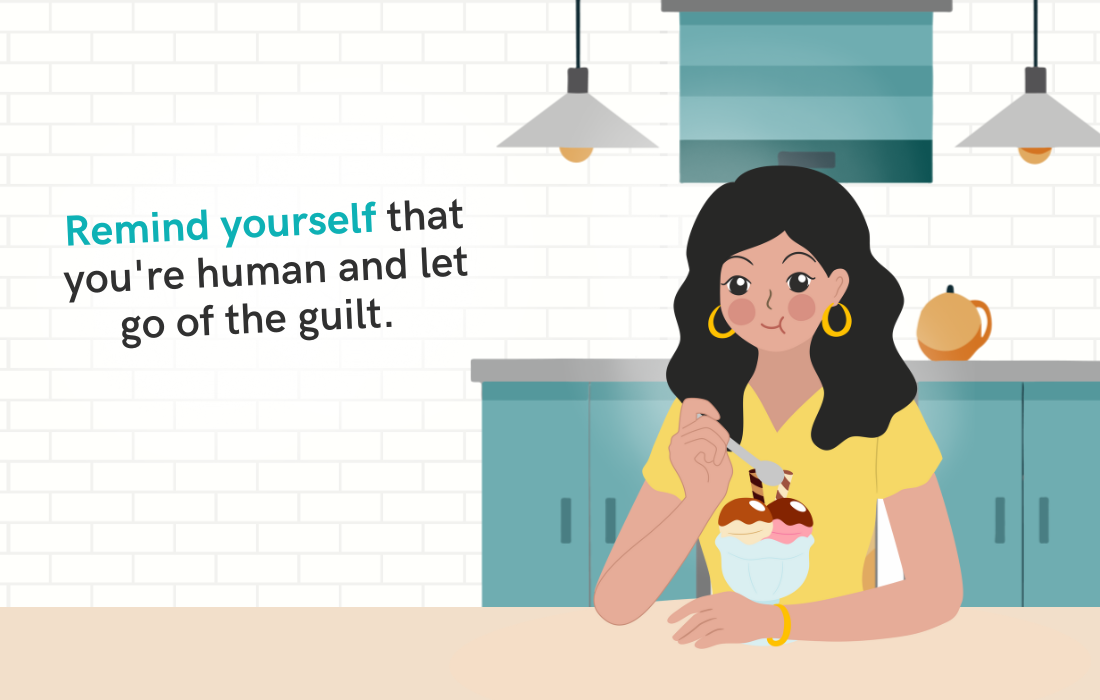
How to Get Back on Track After Stress Eating
First, remind yourself that you’re human and let go of the guilt—stress eating is a common coping mechanism, not a personal failure.
Reconnect with your body by tuning into your hunger and fullness cues at your next meal. Hydrate, move your body gently, and remind yourself that one episode doesn’t derail your entire progress. Learning from the experience can help you respond differently next time. This is a path of a thousand tiny steps forward, so one blip isn’t going to derail all of your progress!
Why Sleep Is Critical If You Find Yourself Stress Eating
Sleep and stress eating are more connected than most people realize.
When you’re sleep-deprived, your body produces more ghrelin (the hunger hormone) and less leptin (the fullness hormone), making cravings harder to resist. Poor sleep also increases cortisol, which drives the urge to reach for sugary or high-carb foods for quick energy. Prioritizing good sleep hygiene can significantly reduce stress-driven cravings.
When to Seek Coaching or Therapy for Emotional Eating
If stress eating feels out of control, happens frequently, or leads to significant emotional distress, it may be time to seek support.
A coach can help you build healthier coping mechanisms, while a therapist can address underlying emotional triggers. If food is your primary way of managing emotions, working with a professional can give you tools to break the cycle and find balance.
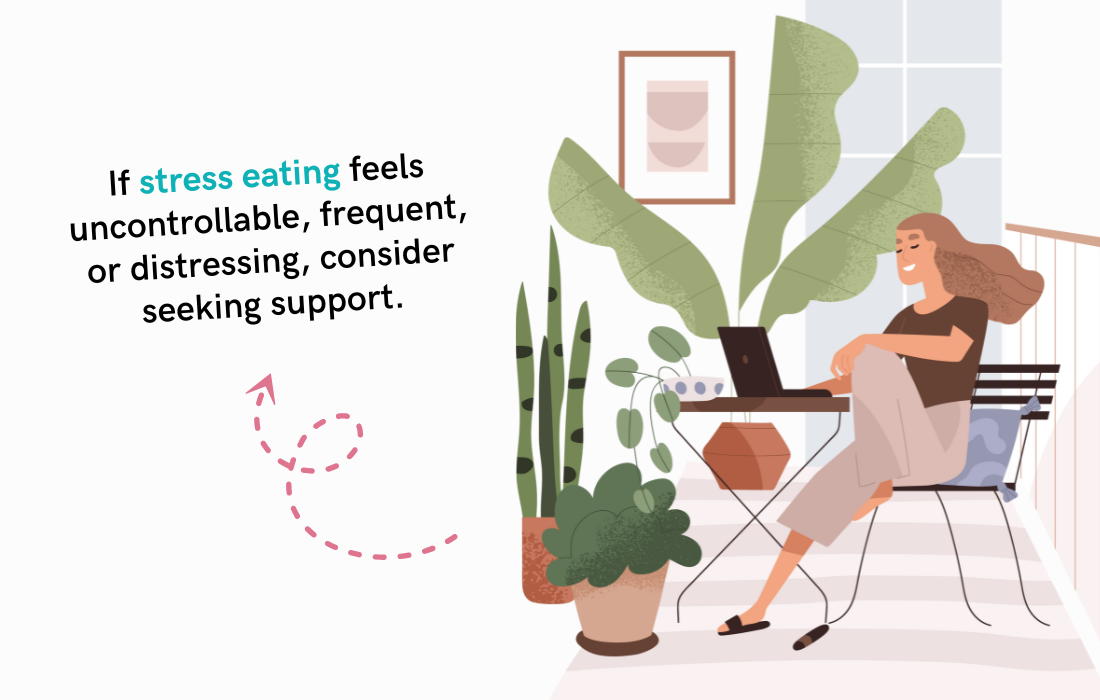
Common Questions
Can binge eating be primarily caused by stress?
Stress can be a big trigger for binge eating, as we can often seek comfort or distraction in food when we have overwhelming emotions.
But binge eating often has deeper roots beyond just stress, like restriction, unmet emotional needs, or chronic dieting.
Can weight gain be caused by eating when stressed?
It can be, especially if stress eating happens frequently and involves eating past fullness.
But weight gain doesn’t always happen—what matters more is your overall relationship with food and how you manage stress in daily life.
Is stress eating an eating disorder?
Not necessarily.
Stress eating is a common response to emotional overwhelm, but if it feels out of control or happens often, it might be part of a larger pattern like binge eating disorder or emotional eating habits.
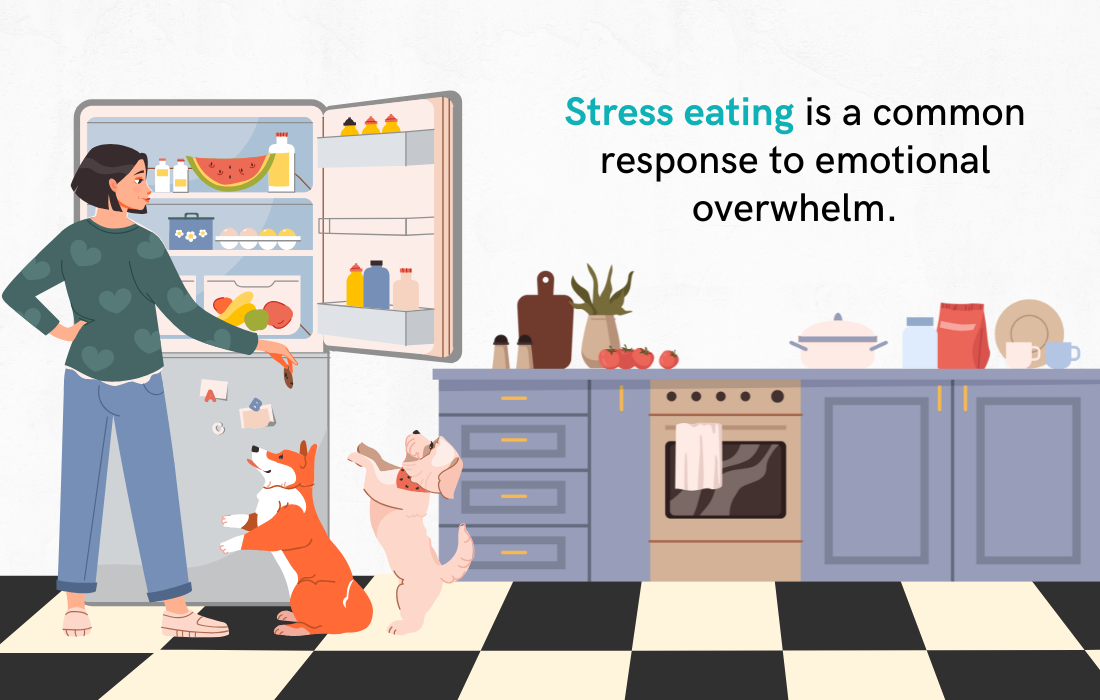
Does eating calm anxiety?
It can seem to in the moment.
Eating can trigger feel-good brain chemicals like dopamine, providing short-term relief. But the underlying anxiety often returns, which is why learning to address emotions without food is key to healing long term.
Why does stress make me hungry?
Stress activates cortisol, a hormone that can increase cravings for high-energy foods like sweets or carbs to fuel a fight-or-flight response. Emotional hunger can also show up when we use food to self-soothe.
How can I heal from emotional eating?
Healing starts with awareness—recognizing when you’re eating from stress or emotions.
From there, practice self-compassion, find other ways to cope with feelings, and work on listening to your body’s natural hunger and fullness cues.
Related Articles
⚪ How to Have Self Control with Food
⚪ Can I Eat Whatever I Want and Still Lose Weight?
⚪ How to Stop Overeating: 27 Things I’ve Done that Work
Get the Normal Eater’s Newsletter
Join 8000+ women who are overcoming overeating, binge eating, and breaking up with dieting forever. Get Jenn’s inspiring and actionable weekly newsletter with the latest posts, podcasts, and tips on how to love your body, find food freedom, and lose weight holistically.
Get the Normal Eater’s NewsletterWork with an Emotional Eating & Holistic Nutrition Coach
Overcome Bingeing and Emotional Eating and Break Up with Yo-yo Dieting
Working with an emotional eating coach and holistic nutritionist can help you get free from the frustrating binge and restrict cycle and stop yo-yo dieting.
You don’t have to be obsessed with food or have a million rules around eating to find your natural weight and learn to love your body. Ready to actually see a lasting change and experience true freedom?
Schedule a 20-min CallAbout the Author:

Jenn Hand has been helping women like you become normal eaters since 2015.
She’s worked with thousands of women, helping them to balance their bodies, end bingeing, stop obsessing over food, and start feeling amazing again. As a board-certified health coach and holistic nutritionist, Jenn knows how to support you in making real positive changes that last.
Her articles have been published on Mind Body Green, Tiny Buddha, Thrive Global and other local and global media platforms. She’s the author of How to Be a Normal Eater and the creator of The Normal Eater’s Club program. Listen to Jenn’s advice and tips on the Cake Doesn’t Count Podcast, or read more of her articles for free on the Food Freedom Blog.
Learn About Coaching!
